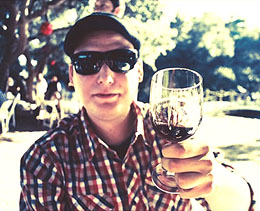 I have made several attempts at making wine. I have used grape juice (Welch’s), rhubarb, blackberry, and have even purchased a kit to make some Merlot. My problem is that they all taste nearly the same with a hint of vinegar. I have been careful to wash and sanitize everything. I am going to try again soon but don’t know what to do different. I even purchased new siphon hose for the Merlot kit and it still had the same off taste.
I have made several attempts at making wine. I have used grape juice (Welch’s), rhubarb, blackberry, and have even purchased a kit to make some Merlot. My problem is that they all taste nearly the same with a hint of vinegar. I have been careful to wash and sanitize everything. I am going to try again soon but don’t know what to do different. I even purchased new siphon hose for the Merlot kit and it still had the same off taste.
Name: Keith H.
State: KS
Hello Keith,
Sorry to hear about the trouble you are having. I can feel the frustration in your writing. There are four ways in which a wine can be taken over by vinegar to some degree, regardless of how much you clean your equipment:
1. Fermentation Is Too Warm: A fermentation should never get over 75° F. When it does it is making life more comfortable to unwanted things like mold, bacteria — vinegar growth is primarily caused by a bacteria know as acetobacter. They like the warmer temperatures and can grow quite comfortably in it. If your fermentation has been getting in the 80’s then this could be the issue.
2. Fermentation Is Too Slow: If you do not have a vigorous fermentation this can leave room for a unwanted microbes to flourish. As a bit of analogy, think of your fermentation as your lawn. The grass is the wine yeast and the weeds are the mold, bacteria, germs… everything you don’t want. One of the best ways to keep the weeds down is to make sure that you have a good stand of grass. The grass takes up everything leaving less for the weeds. It’s no different with a fermentation. By having a good stand of wine yeast you keep these threatening elements at bay.
3. To Much Air Exposure After Fermentation: If you have an active fermentation, exposure to air is not an issue. It’s after the fermentation is over that care needs to be taken. The number one source of air is having too much head-space in the fermenter. Once the fermentation is over you need to eliminate the head-space to keep the wine fresh. Move the wine to another container(s) that it can completely fill. Air allows the vinegar bacteria, acetobacter, to grow.
4. Fermenting With Yeast Under Stress: What I mean by stress is that the wine yeast is not happy. It is not in an environment that is agreeable. This is related to both #1 and #2 above. If the fermentation is too warm the yeast is not happy, and if the fermentation is slow, this is a symptom of an unhappy yeast. The reason behind this is because yeast produces vinegar just like a bacteria does. Just not very much. A healthy fermentation will produce somewhere around .04% of vinegar, but routinely goes as high as .08%. This is a very subtle amount. But if the yeast gets put under stress it can go as high as .15%. An amount that is noticeable.
What can put a yeast under stress? We already covered one of them: the fermentation being too warm. But beyond this, the wine yeast can be over-worked. This can happen when too little yeast is trying to do too much fermentation, or if you use the wrong type of yeast…say a beer yeast or baking yeast instead of using an actual wine yeast. An over-worked yeast can also result from lack of nutrients. This is common issue when water is called for in the wine recipe instead of straight juice. In these situations it is imperative that you also add either a yeast nutrient or yeast energizer to the wine must. There are others. Just realize that keeping the yeast happy will help to keep the vinegar down. You might want to take a look at the “Top Ten Reasons For Fermentation Failure“. This will go over the others in more detail.
Having said all this, please realize that keeping everything sanitary is the #1 reason for getting vinegar in a wine. What I have written above is with this assumption. Keeping things sanitary is first!
In addition, another blog post that may be helpful is “Will My Wine Turn To Vinegar By Racking It?” It approaches this issue from a slightly broader perspective.
Best Wishes,
Ed Kraus
———————————————————————————————————
Ed Kraus is a 3rd generation home brewer/winemaker and has been an owner of E. C. Kraus since 1999. He has been helping individuals make better wine and beer for over 25 years.

I concur that having the primary fermentation too warm can cause too much acetic acid to form. I now have a more temperature controlled area to do my primary fermentation. Last year instead of 14 days for the primary, it went in one day.
Wine case great in carboy but when I open a bottle its vinegar? What’s going on?